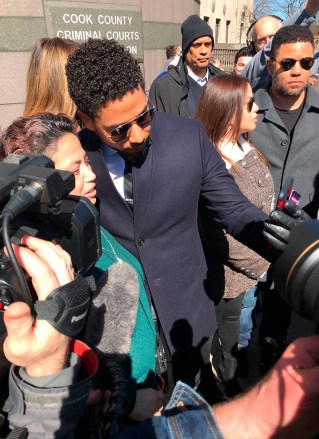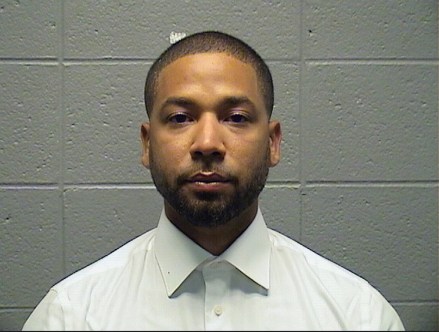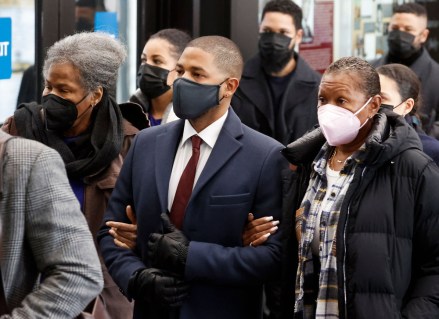
UPDATE (3/27/19), 9:30 PM EST: The FBI is now reportedly reviewing “the circumstances” surrounding “the dismissal” of Jussie Smollett’s 16 felony disorderly conduct charges on March 26, which two unnamed law enforcement officials confirmed to ABC7. HollywoodLife has reached out to the FBI for comment.
UPDATE (3/26/19), 11:35 AM EST: The charges against Empire actor Jussie Smollett — over allegedly staging a racial attack against himself in Chicago on January 29 — have all been dropped, his Chicago-based attorney Ronald Safer confirms to HollywoodLife EXCLUSIVELY. Fox Entertainment and 20th Century Fox Television issued the following statement (on March 26, 2019 at 1:15 PM EST) in wake of this development: “Jussie Smollett has always maintained his innocence and we are gratified that all charges against him have been dismissed.”
ORIGINAL: After being hit with a 16-count indictment on March 7, Jussie Smollett, 36, faces these questions: will he go to prison, and what happens until that decision is made? But that’s not the only possible consequence the Empire star has to worry about, according to criminal lawyers Steven R. Hunter and Dustin E. Smith, who EXCLUSIVELY spoke with HollywoodLife. “Jussie received a class 4 felony for filing a false police report. Class 4 felonies are punishable by one to three years in the Illinois Department of Corrections,” Smith, an Illinois state criminal defense attorney, told us. Even though 16 counts may sound hefty, the attorney told us this: “I know there are a lot of charges, but in most situations, charges that stem out of the same conduct are not served in a consecutive sentence. What that means is that Jussie’s 16 charges won’t be multiplied by one to three years. It’s more likely to be a total of one to three years.” And Hunter, also an Illinois state criminal defense attorney, thought that even a sentence of three years is “unlikely.”
On Feb. 20, Jussie had already been charged with one count of disorderly conduct after being accused of allegedly filing a false police report (and pleaded not guilty), but the 16-count indictment is now based on “two separate sets of charges, one of each lie Smollett allegedly told” after he claimed he was attacked in a hate crime in Chicago on Jan. 29, according to ABC 7. All eyes will be on Jussie as he defends himself once again, and the two attorneys HollywoodLife spoke to predicted how he’ll argue his case. “It wouldn’t surprise me if they come up with some type of drug or alcohol problem. Sometimes the defense could use it to help explain some of the erratic actions, if taken to be true. If there’s a drug problem that’s alleged, there’s another type of probation called ‘TASC,’ which is Treatment Alternative for Safer Communities,” Smith said. “If they can show that he acted in a manner that he did because of a drug addiction or something to that affect. That’s a type of probation that is eligible to be expunged from a criminal record, which means it would be erased from someone’s record as if it never happened.”
Meanwhile, Hunter gave the following breakdown: “Hard to say because I do not have all of the facts and do not know what all of the evidence consists of, but based on news accounts he could argue: (1) he really was attacked (2) if the Nigerian brothers attacked him, they had a grudge (3) if they testify against him they could be doing so for immunity or leniency and/or because of a grudge and therefore have a motive to lie/shouldn’t be believed (4) the prosecution can’t prove he his report was false. [These are potential defenses, not my conclusions or beliefs].” Overall, Hunter’s prediction is that Jussie will “plead guilty for probation” and “a hefty fine.”
A prison sentence can be evaded, however. “Some Class 4’s do not carry a sentence of probation, but this offense does. So Jussie is eligible for probation,” Hunter pointed out, and thinks the particular judge “will go a long way in determining” if Jussie can opt for probation instead. “In my experience, publicity like we see in this case raises the risk that a judge will want to ‘make an example’ out of Jussie…That said, most first offenders with Class 4 felonies receive probation,” he said.
But the extremely publicized nature of Jussie’s case could be bad news for the actor, as Hunter added, “Of course, most Class 4 first offenders do not go on TV and decry their innocence. If he draws the wrong judge or keeps talking, being locked up is a possibility. His probation would most likely be two years, and is capped at 30 months.” Another drawback is the money involved in probation, as Hunter said that “this section allows for a defendant to be required to pay for [an] emergency response up to $10,000. He might have to pay $10,000 per count.” And that’s not the only numbers that were discussed!
Smith said there’s a “penalty of a fine up to $25,000.” Hunter elaborated on this, calculating how expensive this can get when you add up each offense. “So the fine could be $400,000, plus the $10,000 per act cost, which could conceivably be $160,000,” Hunter explained. “That totals $560,000. Unlikely, but possible if he made 16 separate false claims.”
For now, Jussie will await the next step: a trial. “Because he has been indicted, that means the prosecutors have obtained a finding of probable cause. This means, basically, that there is some reason to believe a crime was committed and some reason to believe that he is the person who committed the crime. This means he goes to the felony trial division and there he will be assigned a trial judge to hear his case,” Hunter told us, but trial doesn’t always happen immediately. “It’s going to take quite some time, there will be a lot of paperwork. From what I’ve heard, there are text messages and other evidence,” Smith then said. “It will take a long time to collect all the evidence, and making sure the defense gets copies of all of it. It could take eight months to a year to get all that going. If they’re headed to trial, I would imagine sometime in 2020 they will go trial.”
But Jussie’s not sitting in jail in the meantime. “Jussie will remain on bond until trial. Unless the state files a petition to revoke his bond if he does something wrong, but unless that happens he will remain on bond. That’s not going to change,” Smith said. If it did change, it would be because of “a new offense or a violation of the conditions of his bond,” Hunter clarified. After Jussie was arrested on Feb. 21, he was released that same day in a court hearing on a $100,000 bond. Even though he’s not in jail right now, Jussie does face possible restrictions. “Usually when you’re on bond, you’re forced to surrender a passport,” Smith explained. “You would be ordered to not leave the jurisdiction of the state of Illinois. However, that can be modified for certain defendants that need to travel outside of the state for work. But yes, there will be certain limitations on what he can do.”
Jussie’s lawyer, Mark Geragos, provided the following statement to HollywoodLife: “The fact of an indictment was not unexpected. We knew that there is no way they would expose their evidence to a public airing and subject their witnesses to cross-examination. What is unexpected, however, is the prosecutorial overkill in charging 16 separate counts against Jussie. This redundant and vindictive indictment is nothing more than a desperate attempt to make headlines in order to distract from the internal investigation launched to investigate the outrageous leaking of false information by the Chicago Police Department and the shameless and illegal invasion of Jussie’s privacy in tampering with his medical records. Jussie adamantly maintains his innocence even if law enforcement has robbed him of that presumption.”


